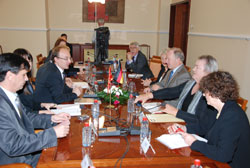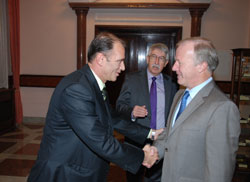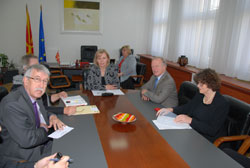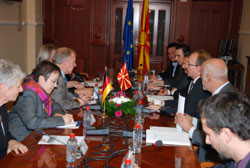Tuesday, 1 November 2011
VISIT OF THE DELEGATION OF THE GERMAN BUNDESTAG TO THE ASSEMBLY OF THE REPUBLIC OF MACEDONIA
 The Delegation from the German Bundestag headed by Mr. Peter Weiβ today met with the members of the Committee on Foreign Policy, the Committee on European Issues, the Deputy President of the Assembly of the Republic of Macedonia Ms. Svetlana Jakimovska, and with the members of the Parliamentary Group for Cooperation with the Parliament of the Federal Republic of Germany.
The Delegation from the German Bundestag headed by Mr. Peter Weiβ today met with the members of the Committee on Foreign Policy, the Committee on European Issues, the Deputy President of the Assembly of the Republic of Macedonia Ms. Svetlana Jakimovska, and with the members of the Parliamentary Group for Cooperation with the Parliament of the Federal Republic of Germany.
Mr. Antonijo Milošoski, Chairman of the Committee on Foreign Policy, speaking about the European Commission 2011 Progress Report, pointed out that the parliamentarians share the disappointment from the fact that Macedonia again did not get the date for opening the accession negotiations, adding that for them this is not an issue of prestige but further impetus for continuation of the reforms in all areas that will also have positive effect on the interethnic relations.
He expressed appreciation for the engagement of Germany in the EU anti-crisis package, emphasizing that the assistance to Greece besides for the stability of the eurozone, is important also for Macedonia.
 The Head of the German Delegation, Mr. Peter Weiβ, said that Germany is in a very specific situation in this period because of the significant economic, but also political activities for protection of the EU, as well as for encouragement of the citizens for continuation of the enlargement process.
The Head of the German Delegation, Mr. Peter Weiβ, said that Germany is in a very specific situation in this period because of the significant economic, but also political activities for protection of the EU, as well as for encouragement of the citizens for continuation of the enlargement process.
Both sides agreed that the name issues must not be an obstacle for continuation of the European integration of the Republic of Macedonia.
Mr. Hajrula Misini, Chairman of the Committee on European issues, pointed out that Macedonia and Germany have friendly relations, and that with regard to the Macedonian Euro-integration processes, the two countries maintain regular dialogue on parliamentary level.
Mr. Misini also said that the Progress Report should not be seen as a report on the name, but as a report that should contribute to the improvement of the quality of living in the Republic of Macedonia. Mr. Weiβ reminded the hosts that the European Commission has recommended for the third time the opining of accession negotiations and congratulated Macedonia on the considerable progress in the process of reforms, pointing out that the country still has certain problems and must make efforts to address them.
 At the meeting with the Deputy President of the Assembly, Ms. Svetlana Jakimovska, special emphasis was given to the development of the cooperation between the two Parliaments through the Programme for international scholarship for the Macedonian students of the German Bundestag. Ms. Jakimovska pointed out that these young people are a bridge between our two Parliaments, and their experience from the study visit in the Bundestag could be used in the reforms necessary for the European integration of the country.
At the meeting with the Deputy President of the Assembly, Ms. Svetlana Jakimovska, special emphasis was given to the development of the cooperation between the two Parliaments through the Programme for international scholarship for the Macedonian students of the German Bundestag. Ms. Jakimovska pointed out that these young people are a bridge between our two Parliaments, and their experience from the study visit in the Bundestag could be used in the reforms necessary for the European integration of the country.
Ms. Jakimovska also said that it would be good if the Assembly of the Republic of Macedonia could receive some feedback from the German parliamentarians to which our students has been assigned in the Bundestag.
The guests from Germany also had e meeting with the Parliamentary Group of the Assembly of the Republic of Macedonia for Cooperation with the Parliament of the Federal Republic of Germany. Mr. Antonijo Milošoski, as head of the Parliamentary Group, called attention to the contacts among the people and the economic cooperation between Macedonia and Germany as the most important issues that the parliamentary Group should promote. He suggested that the German Delegation could contact the German Ministry of Internal Affairs in order to appeal for recognition of the driver’s license of the Macedonian citizens.
He suggested that the German Delegation could contact the German Ministry of Internal Affairs in order to appeal for recognition of the driver’s license of the Macedonian citizens.
Both sides emphasized the importance of the Programme for international scholarship of the German Bundestag. Mr. Weiβ suggested that his Delegation could meet the Macedonian students on internship in the Bundestag in order to give them advice and guidelines regarding their professional future.